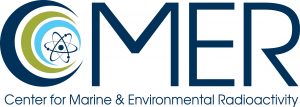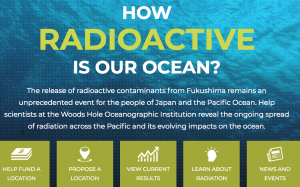More about Café Thorium
Café Thorium is not really a cafe although we have been known to serve espresso and latte throughout the worlds major ocean basins. In fact, we are a serious scientific research team in the Department of Marine Chemistry and Geochemistry at the Woods Hole Oceanographic Institution. Thorium is just one of many radioactive elements we measure. We analyze marine samples for both natural and artificial radionuclides. Examples of naturally occurring radionuclides include those isotopes produced in the decay chains of the long-lived uranium and thorium isotopes (such as thorium-234, lead-210, radium-226), and cosmogenically produced radionuclides such as beryllium-7 and phosphorus-32. The artificial radionuclides we study, such as cesium-137, strontium-90 and plutonium-239,240, were released during atmospheric nuclear weapons testing in the early 1960's, by the Chernobyl nuclear reactor accident in 1986 or more recently from the accident at the Fukushima Dai'ichi Nuclear Power Plant in Japan.
By knowing their source term, geochemistry, and radioactive decay properties, we use radionuclides as in situ tracers of a wide variety of chemical, biological and physical processes. This page was designed with the both serious and not-so-serious science types in mind, so bear with us and let us know what you like, think you like, and just don't care about or understand and we'll try and make the next version more surfer friendly. Sit back with a cup of Java and browse away The people who pay for his work include: The National Science Foundation; the Office of Naval Research; the National Oceanic and Atmospheric Administration; the Department of Energy; the US Environmental Protection Agency; the Woods Hole Oceanographic Institution and the list goes on. You can help support us HERE and get your name on this list!
Learn about Thorium in the Ocean and how we use it.
Links and Downloadable Data
We have produced a tremendous amount of data over the years. Data from specific projects are available on project pages. As well below are links to storage repositories used for our data. If you are interested in data that can't be found, please contact Ken Buesseler (kbuesseler@whoi.edu) with inquiries.
Data on BCO-DMO
The Biological & Chemical Oceanography Data Management Office (BCO-DMO) manages data for researchers and stores it online for public use. Please see Ken's contributions HERE or see below for direct links to the data for specific projects.
Café Thorium Cruises
Café Thorium - equipped with an espresso machine and a ton of scientific equipment - has participated in countless cruises over the last few decades. More information about specific results from these can usually be found on project webpages. At times Ken or others have gone out of their way to document specific expeditions listed below. Also on these pages is information about equipment used, what it is like to be on a research ship, or how the expedition came to be.
- 2011 Fukushima KOK Cruise off Japan - Fate of Radionuclides
- 2005 VERTIGO "K2" Cruise: Search for Higher Particle Fluxes
- 2004 VERTIGO Hawaii Cruise: Chasing Down Ocean Particles
Outreach & Education
RiO5 & SCOR Working Group
The Scientific Committee on Oceanic Research (SCOR) has been around for over 50 years to examine radionuclides in the ocean (see more about this group HERE). Radioactivity in the Ocean, 5 decades later (RiO5) was more recently born to create compilations of papers and lectures related to natural and artificial radionuclides as well as to develop training for the next generation of marine radiochemists and radioecologists. Accomplishments include:
While Café Thorium is our lab group, CMER focuses on more general radioactivity in the environment, information about radioactivity and much more. Please visit CMER to learn more about activities outside of this lab group.
Our Radioactive Ocean
A crowd-funded project established following the accidental release of radionuclides into the ocean following the accident at the Fukushima Dai-ichi Nuclear Power Plant in 2011. Check out our activities HERE!

